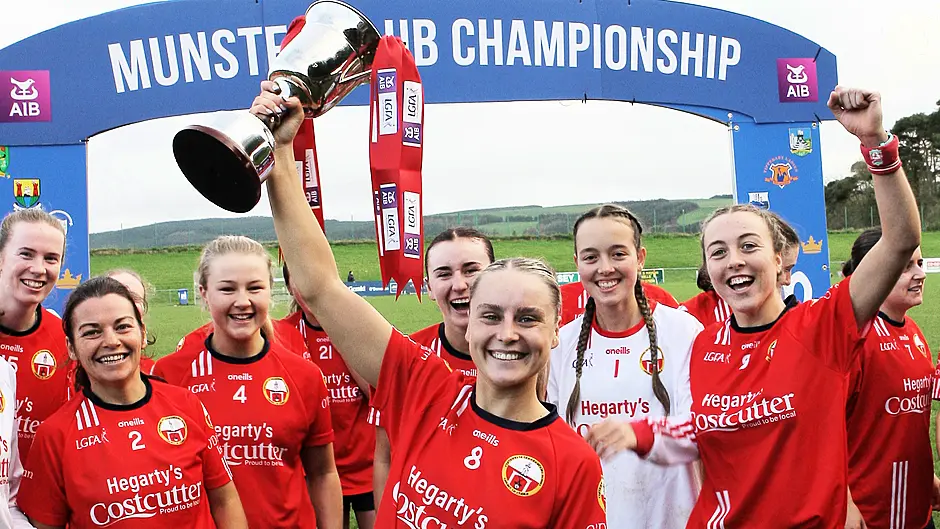
AND then there were 12 – that’s the number of adult men’s football teams in Cork, from junior B and up, still looking forward to training and games as we approach the middle of November.
Kilshanning and Kilmurry remain in Munster intermediate and junior club championships respectively, while four teams remain in the Cork junior A championship, including Kilmacabea, while Goleen are amongst the six still hoping to annex the junior B title.
The county section of the U21 also continues, several months after the divisional sections. For the critics of the revised GAA calendar, that issue is certainly one of the very legitimate gripes. Having been involved with the U21 team in Ross over the last few seasons, I have my own thoughts about that one and will certainly come back to it another time.
Again, there are those who think no games should be played at this time of year, but I don’t agree and not just because of the unseasonably good weather we’re enjoying. Right alongside this column in last week’s Star, page three contained reaction from the O’Donovan Rossa ladies’ Munster intermediate championship win and a quote there from Fionnuala O’Driscoll caught my eye. The Skibb forward said ‘Our captain Laura (O’Mahony) always asks if we want to be back at training during the week. I can’t think what I would do if I didn’t have training throughout the winter and get to see the girls every week.’
Firstly, with that attitude it’s not hard to see why the Skibb women are enjoying such success of late. Secondly, I can absolutely relate to O’Driscoll’s comments. The three best winters many of us in Rosscarbery ever put down were in the years 2003 to 2005. There is nothing better than a long successful season with your club, and God knows it’s good for people to have games to enjoy at an often dreary time of year. In 2005, for example, we played the Munster intermediate final in Páirc Uí Rinn on December 21st, successfully defending our title against Pallasgreen of Limerick.
The Carbery Rangers GAA history book notes that ‘a second Munster intermediate title had been won and Ross went into Christmas week in a celebratory mood again.’ You can be fully sure we did enjoy our Christmas that year. I’m not suggesting we should aim to be playing football that late in the year, but some delays can’t be accounted for. Trust me, it’s no great penance to do so when you’re on a winning run.
Another complaint I regularly hear these days is that the season is now too long, to which I have a few things to say in response:
- The GAA season has always been all year round for successful teams, that’s nothing new.
- The club season starts in March now and ends in January if you make it to an All-Ireland final, which is favourably comparable to the length of the rugby and soccer seasons in this country and is only for the lucky few who get that far.
- Wanting a short season is a loser’s mentality, toughen up and get on with it! These winter games brighten up our days. I guarantee you the Skibb ladies would agree.
I have little patience for some of the whinging I hear for those who love to moan and complain. There are some valid criticisms of the new structures, and the diminished U21 competition is definitely one, but we have made great strides from the old ways and must look to improve what we have now, not reverse it.
***
Another interview that caught my eye last week was with Zach Tuohy in The Irish Independent. This was an extensive and wide-ranging interview with an interesting character who has led an interesting sporting life. He is bullish in his rebuttal of criticism from high-profile GAA stars like Mickey Harte or Tomás Ó Sé who feel the AFL are predatory in picking off the best Irish talent, and that more should be done to prevent players moving to Australia to pursue a career in AFL.
Tuohy said: ‘If every Irish player said no to the prospect of moving to Australia, I would be delighted, but that is not a decision that can be made by former players canvassing against the AFL. That’s the decision the players themselves need to make. If the GAA gets to the point where the players are treated so well that the prospect of leaving is just not even on the cards, then that’s the end goal. But until we get there, how could you, in all good conscience, try and stop young players doing what I did?’
Tuohy also cites the demands placed on GAA players now as being unsustainable, and while this is well-worn ground, his views are worth listening to. He is still in touch with players who play for club and county in Laois, and ‘was taken aback when I went back and saw them train’. He wonders about the demands of working full time and training as hard as is required these days, while receiving little or nothing in return. It’s an age-old discussion, however I do start to wonder where the tipping point is.
I referenced earlier that the GAA season is similar in length to the amateur soccer and rugby seasons in this country, shorter if you are beaten in the group stages, longer if you are the chosen few who are successful in a provincial club championship. However, where the disparity lies are the demands placed on GAA players in terms of volume of training and sacrifices in social life. It is a culture driven by over-zealous managers, coaches and sometimes players, and has existed in the GAA since as far as I can remember.
Think back to the famous stories of Castlehaven players and their training habits, or Kieran McGeeney running on the treadmill the day after lifting the Sam Maguire, or the idea that Tyrone were a team of religiously focussed teetotallers who didn’t look at a drink in the season they first claimed All-Ireland title (a myth well and truly busted by Owen Mulligan several times since). It is the mindset that you always have to be doing more, more than your opponent, more than you ever did before, if you want to be successful. That’s an idea that Tuohy rebuts also, as he said ‘A lot of people’s impression of professional clubs is that more is more, that you just train more and everything’s more intense and more full on. That’s just not true.’
I’ve spoken with Ciarán Sheehan a couple of times on this since he came home from Australia. He agreed that the training was tough for a few weeks in pre-season, but when the season came, it was mostly about recovery in between games. This to me is where the balance is wrong in the GAA – we do love a little bit of self-flagellation. Unless we are running ourselves into the ground and living like Tibetan monks, we never feel like we are doing quite enough. As I often thought when I was playing with Cork, if professional athletes don’t train with the same intensity as GAA players, while enjoying more freedom in their social life at the same time, something is wrong.
We need to make our games as attractive as possible to younger people, and addressing the culture of more needs to be addressed. Football and hurling are huge parts of our lives, but they can’t be everything. It’s unsustainable for players, management and, increasingly, club officials.
Some might read this and suggest what I’m saying sounds a little contradictory to my point above about successful teams playing all year around, but I don’t think it is. During those three years in a row, we were given breaks to enjoy ourselves when the time was right. That’s what GAA players need, some downtime during the season to switch off from the training and games, not trying to arbitrarily cut back the season when there are too many factors to consider. Ultimately, my main concern is that the club championships are given the time they need to proceed without interference and that players are given at least a semblance of fixture certainty. As long as that is respected, I’m a happy man.










